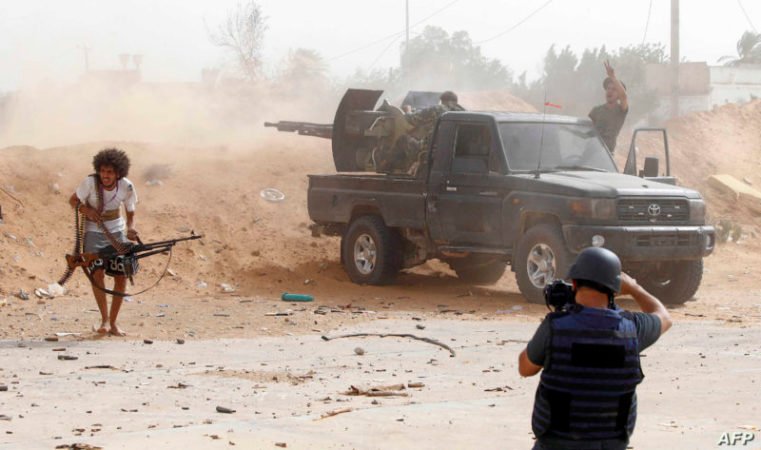Libyan Civil War: A Continuation of Syria’s Proxy Wars?

The battle to take over Libya has surpassed tribal, regional, political, religious and international lines. The Second Libyan Civil War erupted in 2014 and has witnessed rival factions, the Government of National Accord led by Prime Minister Fayez al-Sarraj, and Field Marshal Khalifa Haftar with the support of Libyan National Army (LNA), face each other off in the ongoing conflict. Armed groups such as the Islamic State have also played a role. Most significantly, the civil war has internationalized as various countries have used Libya as a proxy playground to push their own strategic and economic interests.
Libya’s ongoing civil war bears considerable similarities to the conflict in Syria as the same foreign actors attempt to influence it. It can be said that the proxy wars in Libya have become a continuation of proxy wars in Syria. German Foreign Minister has stated that “If the developments in Libya are left to continue, then Libya will become the next Syria and we do not want to let that happen.”
Conflict in Libya has been a constant since the Arab Spring uprising in 2011. The uprising combined with the removal of Muammar al-Gaddafi who had been the country’s leader for over forty years has resulted in an ongoing instability wherein Libya has struggled to rebuild its state institutions.

Background
After 2011, General National Congress (GNC) came into the position of authority but faced various challenges such as attacks by Islamist militants which posed a threat to their legitimacy. General Haftar, an old friend of Colonel Gaddafi who helped him consolidate his power, launched Operation Dignity led by LNA to combat the Islamist militant groups who continued to take control in Tripoli and a majority of western Libya.
The United Nations sought to find a resolution for the ensuing civil war by attempting to form a unity government as they facilitated dialogues between the Tobruk-based HoR who support General Haftar and the Tripoli-based GNC, and brokered the “Libyan Political Agreement” in 2015. Consequently, GNC garnered UN backing but continued to face a series of obstacles. However, armed Islamist groups expanded their scope and efforts to wage broader regional violence which further impeded efforts to form a unity government.
Recent Developments
GNA declared a state of emergency in Libya’s capital city of Tripoli in September 2018 as the situation intensified with increased fighting and rockets being fired in residential areas. The current phase of conflict developed when General Khalifa Haftar attacked and attempted to capture the capital, Tripoli, one of the last remaining strongholds of the internationally recognized
Strong interventions by Turkey in support of the Tripoli government seem to have been successful as General Haftar’s men, along with a force of several thousand Russian mercenaries, are in retreat. Forces of GNA also recaptured Tarhouna as part of an advance, further contributing to the ending the 14-month offensive on Tripoli.
General Haftar has an established control from east to Benghazi and had aimed to ultimately unify the country under his power by marching west to attack Tripoli and removing the internationally recognised Government of National Accord led by Fayez al Sarraj.

International Actors and Efforts
Libya has Africa’s largest oil reserves and is a key player in the natural gas market. The country is also a major gateway for African migration into Europe through its nearly 2000 km coastline on the Mediterranean Sea. In addition, the rise and expansion of the Islamist militant groups pose a threat to the neighbouring countries. All these factors result in a plethora of International actors being involved in the conflict.
It is crucial for Russia and Turkey to be involved in the Libyan conflict to ensure future influence and to be perceived as major powers in the region. The United Arab Emirates, Egypt and Jordan are on General Haftar’s side, offering his rebel troops weaponry and logistical support. Qatar is on the other side backing the UN-recognised GNA alongside its ally, Turkey. In addition, France has expressed its support for General Haftar, whereas Italy puts its weight behind Prime Minister Serraj’s government.
United States’ involvement in Libya has been ongoing as it continues to operate against Islamic State militants that have plagued the country for close to a decade now and threaten to spill over in the region.
In January this year, a conference was held in Berlin where international powers with conflicting interests in Libya’s civil war called for a cease-fire and agreed to respect a much-violated arms embargo in an effort to end the country’s long-running conflict. The talks were conducted by leaders of 11 countries, and Libya’s two main rival leaders but separately. However, the ceasefire is said to have been broken hours after its initiation. Another ceasefire was attempted by the UN in late March in the wake of COVID-19, however, this too quickly fell apart.

Humanitarian Impact
UN Refugee Agency had reported in 2017 that “An estimated 1.3 million people are in need of humanitarian assistance in Libya.” It also added, “The country presents a complex displacement scenario with 217,002 people displaced inside the country (IDPs) and 278,559 people who have returned home (returnees).”
UN officials this year have stated that at the end of 2019, more than 345,000 people had fled their homes and become displaced, including 150,000 in and around Tripoli, since Haftar’s offensive began last April. They informed that more than half the nearly 900,000 people in need of humanitarian assistance are women and children and more than 30 percent are migrants and refugees.
UNICEF Executive Director released a statement in January which focused on the plight of the children in Libya. She stated, “Tens of thousands of Libyan children are at risk amidst the violence and chaos of the unrelenting conflict in Libya.” She outlined the alarming number of deaths and injuries of children and stressed their recruitment in the war. “Today, children in Libya are in a dire and untenable situation that the rest of the world should find unacceptable,” she added.


















